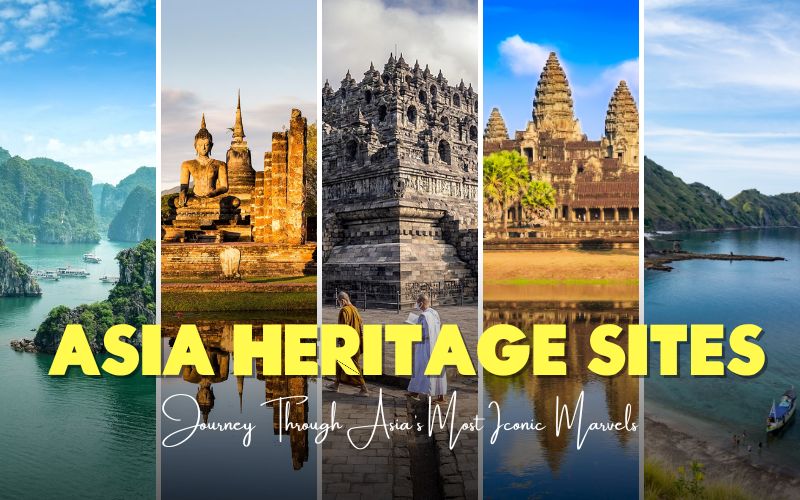
Have you ever set foot in Asia, the land of ancient temples in the deep forest, massive stone structures that defy time, or breathtakingly beautiful stretches of wild nature? In this blog, we will walk you through the most magnificent places in Asia, where the past still whispers in the heart of the present, and every stone, forest, or temple tower has a story worth listening to. From the legendary wonder of Angkor Wat to the mysterious caves of Phong Nha – Ke Bang, here are top 10 UNESCO Heritage Sites in Asia that every traveller should experience at least once in their life!
What Is UNESCO and why Are These World Heritage Sites So Special?
When mentioning “UNESCO-recognised attractions”, people tend to think of places with magnificent scenery, profound historical value or rare pristine nature. So, what exactly is UNESCO? And why are World Heritage Sites becoming “once in a lifetime” destinations?
UNESCO stands for United Nations Educational, Scientific and Cultural Organisation, which was established in 1945. Its mission is to protect and promote cultural heritage and promote educational, scientific and cultural exchanges. One of the most prominent projects of the organisation is the World Heritage List, which records and protects buildings, landscapes or relics regarded as “the common heritage of all mankind”.
To be listed in the World Heritage List, a place name must meet at least one of the ten strict criteria related to:
- Timeless historical – cultural value
- Unique architecture or art
- Exceptional ecosystem or natural landscape
- Symbolic role in development of humanity
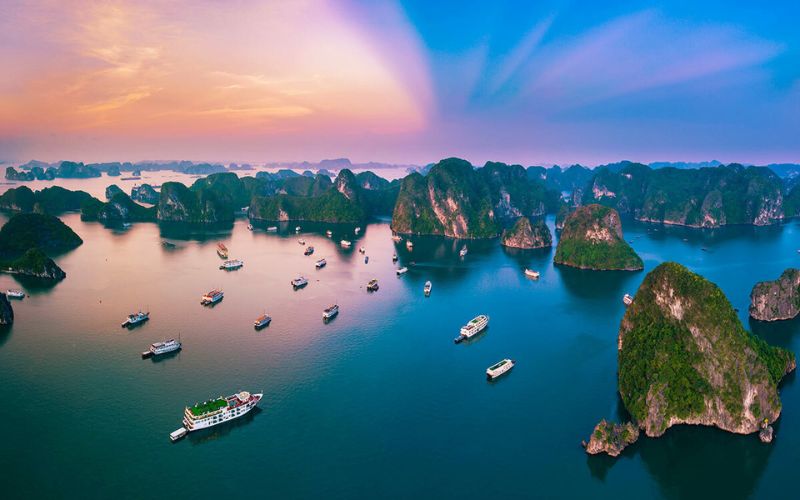
The special of World Heritage Sites
What makes these heritages special is that they are not only meaningful to a country but also of global importance, as part of the “common memory” of mankind. Once a site is recognised as a world heritage site, it will be more strictly protected and attract the interest of international tourists, researchers and the media.
As far as Asia is concerned, a continent rich in traditions, multiculturalism and natural wonders, UNESCO’s heritage is not only an ideal stop but also a gateway to deeply explore the history, beliefs and essence of various countries. Read on the next part to find out top 10 UNESCO heritage sites in Asia, the hidden gems are waiting for you to explore!
Top 10 UNESCO Heritage Sites in Asia
Angkor Wat, Cambodia
The first site on the list is Angkor Wat, the world’s largest regional complex and the national symbol of Cambodia. Built in the 12th century under the rule of King Suryavarman II, this site was initially a Hindu Temple which worshipped Vishnu and then changed to a Buddhist Temple as it is today.
The architecture of Angkor Wat is an elegant combination of art and the region. Every towering tower, long corridor, and meticulous curve conveys a story. This complex is not merely the testament of the glorious development of the Khmer reign but also the attractive destination for tourists who love history and architects. One of the most fascinating experiences is exploring Angkor Wat at sunrise or sunset. This is the time when the sun casts a golden hue on the ancient walls, creating an unforgettable mystical setting that each of us can admire only once in a lifetime.
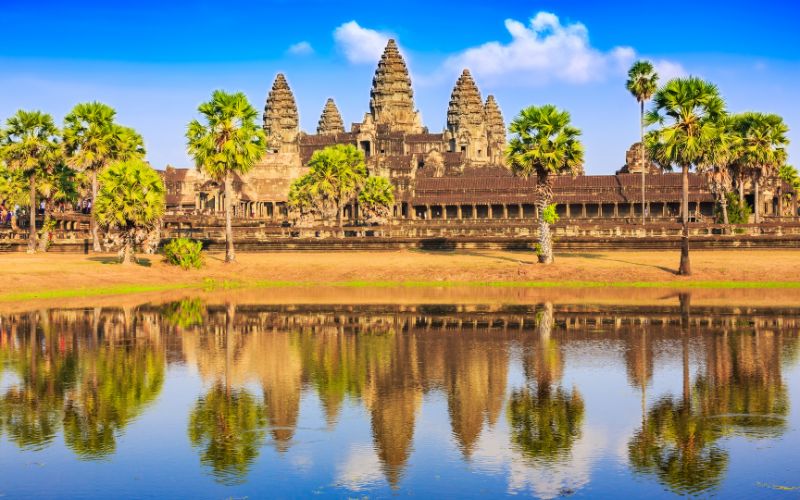
Angkor Wat, Cambodia
Great Wall of China, China
The Great Wall of China is one of the most majestic architectures in human history. This site stretches over 21,000 kilometres and passes through many provinces in China. The construction of the first brick began in the 7th century BC and continued through numerous dynasties, particularly the Ming dynasty. This structure was designed to protect the country from invasion from the North. With its walls winding through mountains, deserts, and grasslands, the Great Wall is not only a symbol of the strength and indomitable will of the Chinese people but also an attractive destination for tourists who love history and nature. Walking on the ancient walls and admiring the majestic surrounding landscape will bring an unforgettable experience to every visitor.
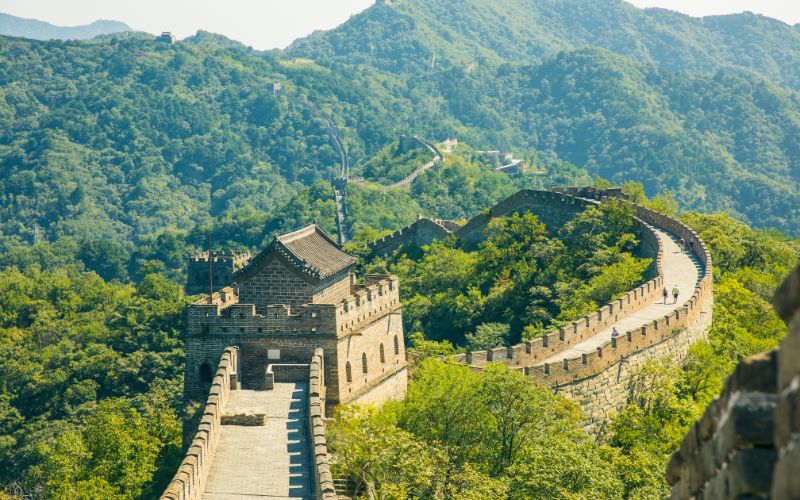
Great Wall of China, China
Taj Mahah, India
Have you ever considered that architecture can evoke feelings of love? Located in Agra, the Taj Mahal is an illustrative symbol of eternal love. This mausoleum was built by Emperor Shah Jahan from 1632 to 1653 to commemorate his beloved wife Mumtaz Mahal. It is made entirely of white marble, with exquisite carving patterns and carefully carved gems. The architecture of the Taj Mahal is a harmonious combination of Islamic, Persian and Indian styles, which is perfectly combined in form and meaning. It is recommended to visit this site at dawn or sunset, when the Taj Mahal rises in spledor under gentle light, attracting millions of visitors from all over the world. It is fair to say this is the immortal beauty of love.
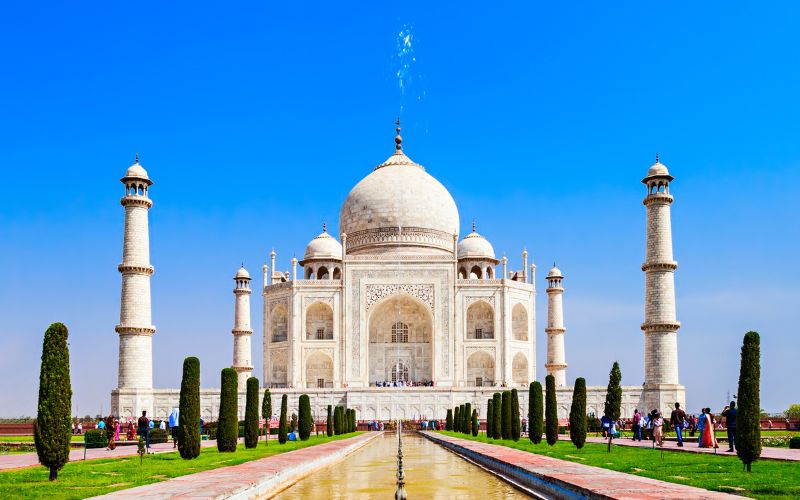
Taj Mahah, India
Ha Long Bay, Vietnam
If you’re seeking a breathtaking natural landscape surrounded by fields, Ha Long Bay is the perfect destination. Located in Quang Ninh Province, Vietnam, Ha Long Bay is known as a fantastic maze in the sky, and thousands of limestone islands wander in the green sea water. Every island and cave here is like a work of art, carved by clever hands.
Ha Long Bay is famous not only for its magnificent beauty but also for legends handed down from generation to generation, such as the mother dragon coming down to the world and the fountain releasing jade to defend the motherland, creating this beautiful scenery. There are several fascinating activities awaiting in Ha Long Bay such as kayaking through the majestic limestone karsts, exploring magnificent caves and visiting fishing villages. However, the must-do is hopping on a cruise in the middle of the bay. When the sun sets, you will feel a charming peace, just like entering another world, where only the wind, waves, and heart tremble quietly in front of the beauty of time.
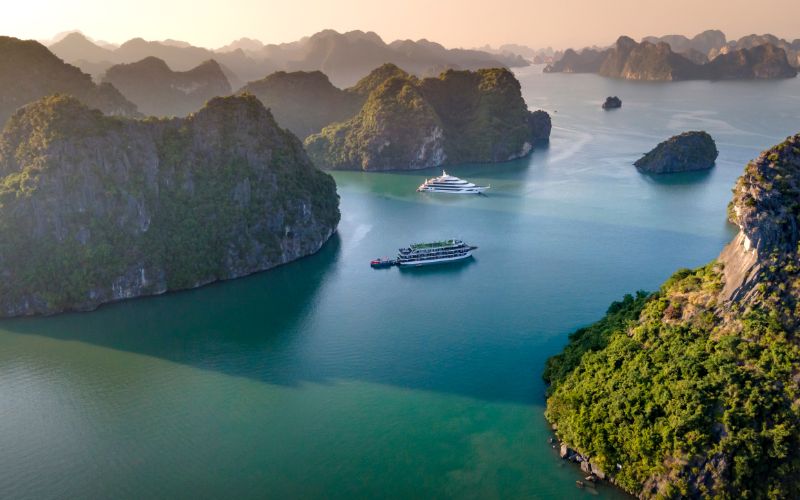
Ha Long Bay, Vietnam
>>> Embark on our Top 10 Vietnam Tours & Holiday Packages for First Visit and Returns 2025/2026 to uncover the hidden gems of the S-shaped country.
Borobudur Temple Compounds, Indonesia
Located in the midst green forest on Java Island, Borobudur Temple seems to be a sacred and mysterious religious miracle. Built in the 8th century, this temple is not only the largest Buddhist center in the world, but also a symbol of Indonesian spiritual culture. Every tower and relief on the rock of Borobudur tells the profound story of Buddha’s life and the road to enlightenment.
Different from the majesty of the grandiose structures, Borobudur offers a sense of intimacy and serenity. In the early morning, when the fog is still scattered among the stone towers, the light of dawn gently echoes through the majestic Buddha, you will feel a profound peace, as if time stopped to give way to the meditative soul.
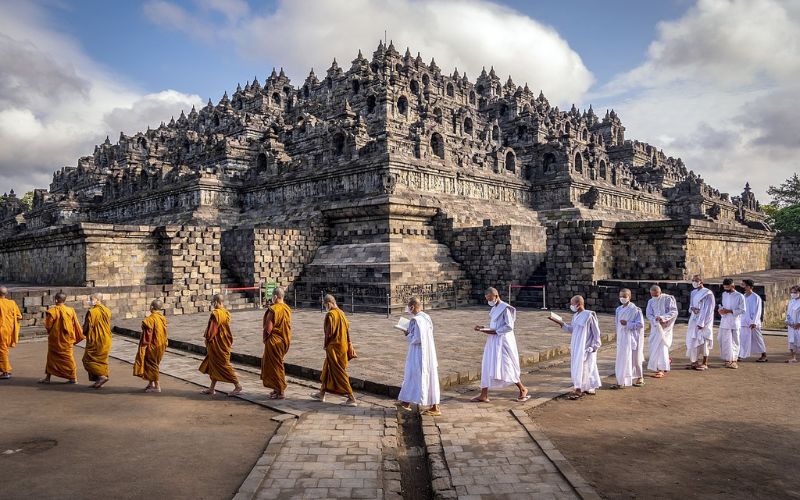
Borobudur Temple Compounds, Indonesia
Horyu-ji Buddhist Monuments, Japan
Hidden in the quiet countryside of Nara Horyu-ji Buddhist Monuments is not only an ancient temple but also a sacred memory of early Japan. The structure was built in the 7th century by Prince Shotoku, the main hero who spread Buddhism in Japan. It is one of the oldest wooden buildings in the world.
Passing through the gate of the temple, visitors seem to be far away from the bustling modern world and return to a meditation and quiet space. The curved roof, the colourful wooden walls, and every statue and architectural detail are modest yet as profound and tenacious as the Japanese spirit. Horyu-ji is not only a destination for history lovers but also a place for us to reconnect with ourselves in the space of meditation. In that quiet scene, all the hustle and bustle of life seems to have disappeared, leaving only gentle peace to spread in the mind.
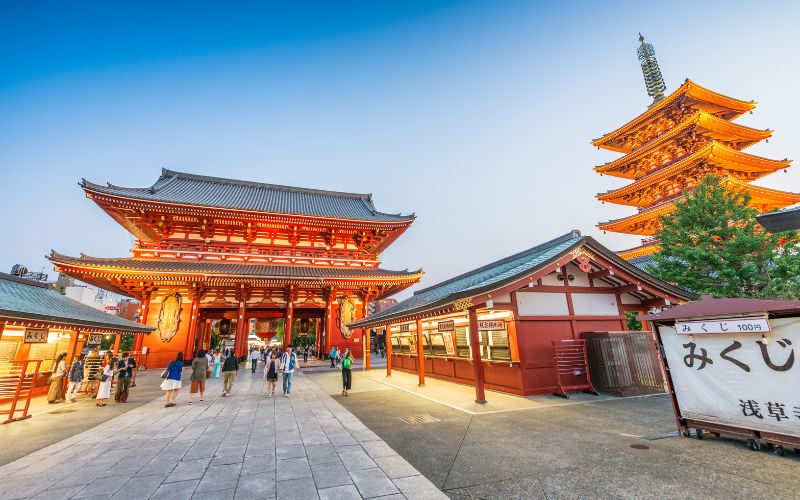
Horyu-ji Buddhist Monuments, Japan
Hoi An Ancient Town, Vietnam
Hoi An is like an ancient book, opened in the heart of central Vietnam, where time seems to slow down to preserve every tree-lined roof, every alley full of lanterns, and every wooden house painted with the color of memory. As a prosperous port from the 15th century to the 19th century, Huian Ancient Street is not only the meeting point of Vietnamese, Chinese, Japanese, French, and other cultures but also a living symbol of beauty, harmony, and elegance.
Strolling through the old tiled streets, you will be involved in another world; there is no siren of cars, only the hum of wood, a faint dull smell, and warm yellow lights falling from lanterns. In the daytime, Hoi An attracts tourists by its ancient architecture and colorful craft stalls, and at the night, the town like magic, glitters brightly by the Hoi An River bright flowers. It is fair to say that Hoi An is not just for sightseeing but for feeling, for living slowly, and for loving more the gentle and profound beauty of a land of memories that still breathes.
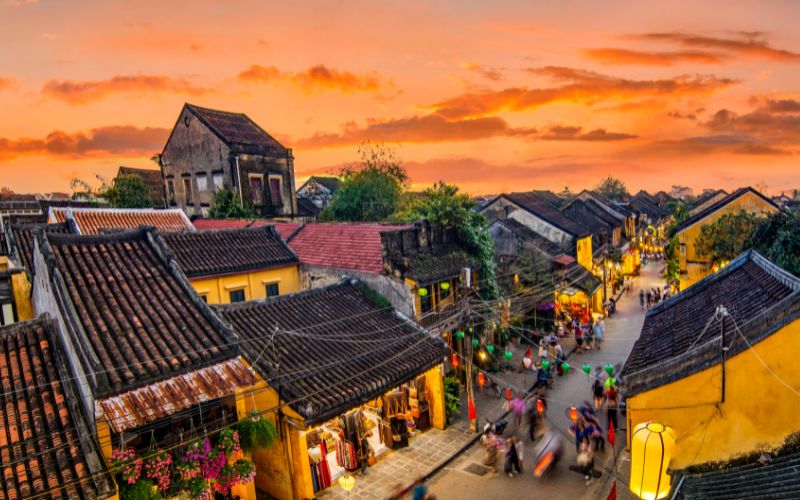
Hoi An Ancient Town, Vietnam
Komodo National Park, Indonesia
Amidst the blue ocean of Nusa Tenggara Islands, Komodo National Park presents an untamed wild world, where you can not only enjoy the scenery but also the boundary between primitive people and nature. This is the home of the legendary Komodo dragon, a huge and powerful ancient creature that only appears in science books or legends.
Not only dragons, but also Komodo attracts tourists because of its rich terrestrial and underwater ecosystems. The long, dry grass hills, unique pink sand beaches, vibrant coral reefs, and crystal-clear waters on Padar Island are ideal places for trekking, diving, or simply quietly watching the sunset. Komodo is not for those who seek comfort; this is a rendezvous for adventurous souls craving the feeling of “living truly” in the wild. When you leave, you’ll take with you a love for the Earth and memories.
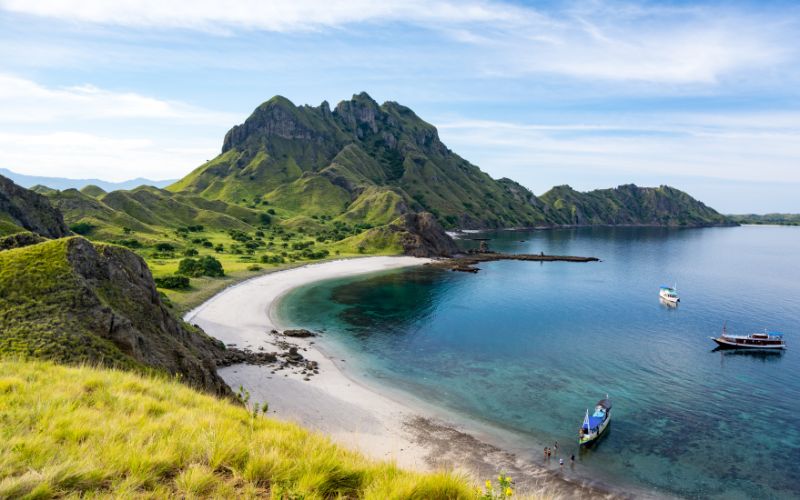
Komodo National Park, Indonesia
Sukhothai Historical Park, Thailand
Not as bustling as Bangkok or Chiang Mai, Khukhothai captivates visitors in an exceptional way: the quiet, ancient and pure beauty of the past. Hidden in the quiet plains of central Thailand, Sukhothai Historical Park is the first symbol of ancient Thai civilisation and was once the glorious capital of the 13th century.
Here, you will see hundreds of reconstructed scenes, including red brick temples, majestic Buddha statues, and gentle facial expressions that seem to smile over time. Sukhothai is more than just a heritage park; it is a museum that lives in nature. You can ride a bike under an ancient tree and quietly watch the flat lake reflect the ancient ruins. For those who love history and long for inner peace, Sukhothai is not only a destination but also a journey back to the roots of Thai culture, where everything is slow, sacred and profound.
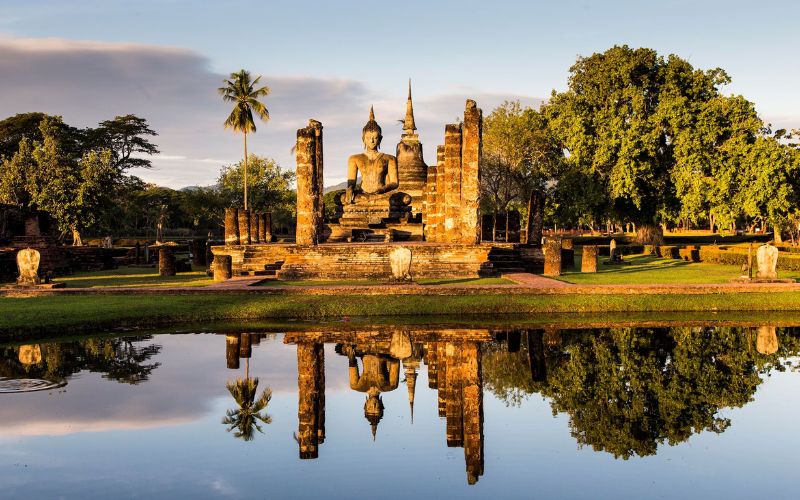
Sukhothai Historical Park, Thailand
>>> Are you into the intricate Buddha architectures of the Land of Smiles? Reach out to our Thailand Tours & Travel Packages for 2025/2026 and indulge in the rich cultural heritage adventure.
Phong Nha – Ke Bang National Park, Vietnam
If there is a place that makes you feel like you’re exploring another planet, where there are ancient, unsolved mysteries hidden underground, it is Phong Nha – Ke Bang National Park. Located in the magnificent limestone mountain of Quang Binh, this national park is not only a natural treasure of Vietnam but also a natural treasure of the world. Because of its unique geological value and primitive ecosystem, it has been recognised as world natural heritage by UNESCO.
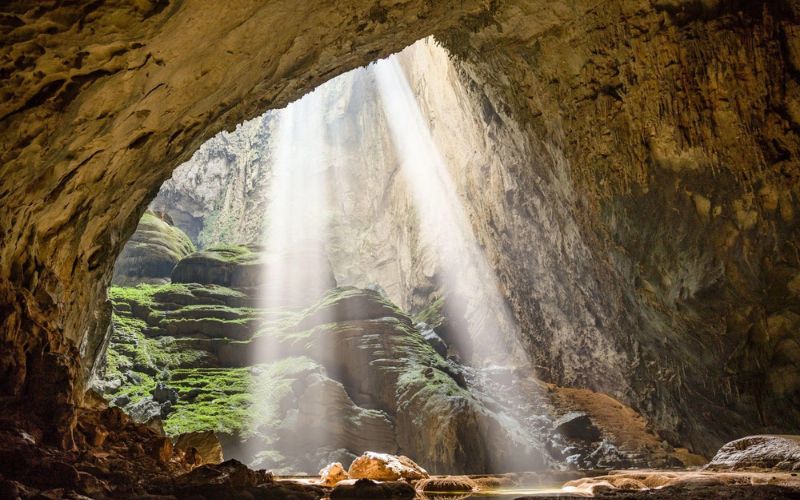
Phong Nha – Ke Bang National Park, Vietnam
Phong Nha – Ke Bang is a “cave kingdom”, with more than 300 large and small caves discovered, each with a unique structure and wonderful beauty. Son Doong Cave, known as the largest cave in the world, can accommodate a Boeing 747. The cave has a unique ecosystem, underground rivers, and virgin forest. There are other caves, such as Phong Nha Cave, Paradise Cave, and En Cave… Each cave is a world of its own with sparkling crystals, underground rivers, and magical lights. They are not only a natural wonder but also a journey to find yourself in the grandeur, where you will find yourself insignificant in front of the vastness and miracle created. Coming here, you will return to your original feelings before standing in the pure beauty of the earth.
Suggested Itineraries to Discover UNESCO Sites in Asia
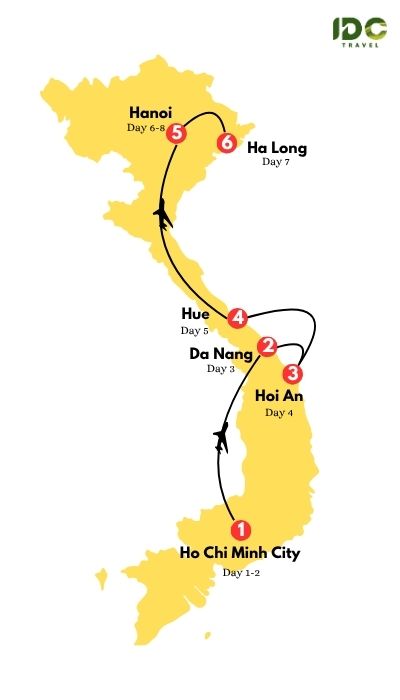
Itinerary 1: Vietnam’s World Heritage Sites Tour from Ho Chi Minh City to Hanoi in 8 Days
Day 1: Ho Chi Minh City Arrival: Arrive in the bustling Ho Chi Minh, check in and relax at the hotel.
Day 2: Ho Chi Minh City Tour: Embark on the city tour passing through most highlights such as Notre Dame Cathedral, Saigon Post Office, and Ben Thanh Market.
Day 3: Ho Chi Minh City – Transfer to Da Nang – Visit Hoi An: Take a flight to Da Nang, visit Cham Museum and Marble Mountain, then transfer to Hoi An.
Day 4: Hoi An – Transfer to Hue: Explore the UNESCO Heritage Site, with lantern-lit streets and old-painted houses. After that, transfer to Hue, the former capital of Vietnam.
Day 5: Hue City Tour: Discover the most famous destination of Hue, including sacred tombs, the Huong River, and Dong Ba Market.
Day 6: Hue – Fly to Hanoi: Take a morning flight to the capital city Hanoi. Upon your arrival, visit Ho Chi Minh Mausoleum, One Pillar Pagoda, Temple of Literature and take a cyclo tour through the Old Quarter.
Day 7: Hanoi – Ha Long Bay Cruise: Embark on a cruise glidding throug majestic limestone karts of Ha Long Bay.
Day 8: Departure from Hanoi
>>> Detailed Itinerary: Here
Itinerary 2: Discovery of UNESCO Sites in Southeast Asia 26 Days
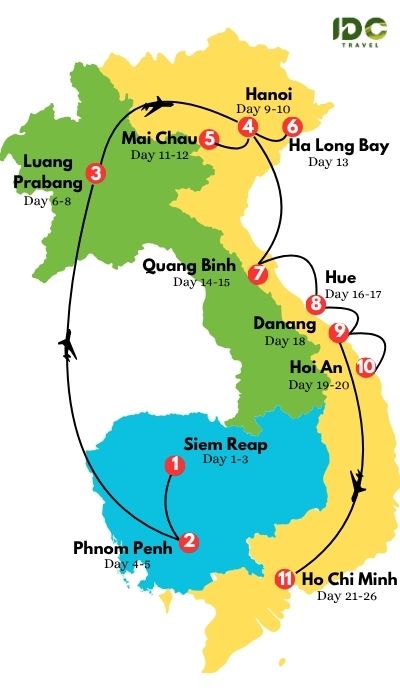
Day 1: Arrive in Siem Reap
Day 2: Full-day Explore Siem Reap City
Day 3: Visit Famous temples in Siem Reap & Fly to Phnom Penh
Day 4: Visit Phnom Penh’s Highlights & Fly to Vientiane
Day 5: Visit Vang Vieng’s Highlights
Day 6: Visit Vang Vieng & Transfer to Luang Prabang
Day 7: Explore Luang Prabang & Visit Pak Ou Caves by cruise
Day 8: Explore Luang Prabang’s Temple Highlights & Visit Kuang Si Falls
Day 9: Fly to Hanoi & Watch a Water Puppet Show
Day 10: Hanoi City Tour
Day 11: Transfer to Mai Chau & Explore the countryside
Day 12: Visit ethnic villages & Return to Hanoi
Day 13: Transfer to Ha Long & Embark on a cruise
Day 14: Return to Hanoi & Take night train to Dong Hoi
Day 15: Visit Phong Nha Caves
Day 16: Visit Vinh Tunnels & Transfer to Hue
Day 17: Hue City Tour
Day 18: Drive to Da Nang – Hoi An
Day 19: Explore My Son Sanctuary
Day 20: Free Day in Hoi An
Day 21: Transfer to Da Nang & Fly to Saigon
Day 22: Saigon City Tour
Day 23: Explore Mekong Delta & Transfer to Can Tho
Day 24: Visit Cai Rang Floating Market & Return to Saigon
Day 25: Free Day in Saigon
Day 26: Departure from Saigon
>>> Detailed itinerary: Here
In conclusion, these 10 UNESCO Heritage Sites impress travellers not only by their majestic beauty but also by their fascinating cultural stories and inspiring historical meaning. If you are looking for an adventure of your lifetime, these are definitely unmissable destinations. Contact us for more information; we are thrilled to be your companion in this journey!
Read more:

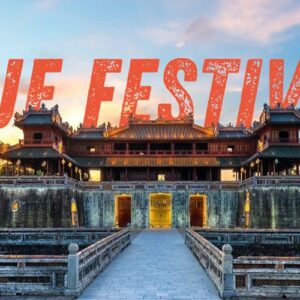
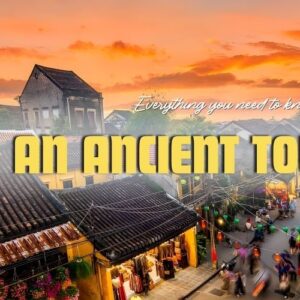

Loved reading this! I’ve been to Halong Bay and Angkor Wat, and both were breathtaking in very different ways. I’d never even heard of Borobudur before. How crowded does it get during sunrise though?
Dear Avianna,
Thank you so much for your kind words! As for Borobudur, sunrise is definitely a magical experience, but it can attract a crowd, especially on weekends and holidays. For a more peaceful visit, we recommend going on a weekday and arriving early to secure a good spot. Let us know if you’d like help planning it, we’d be happy to assist!
Best regards,
IDC Travel Team